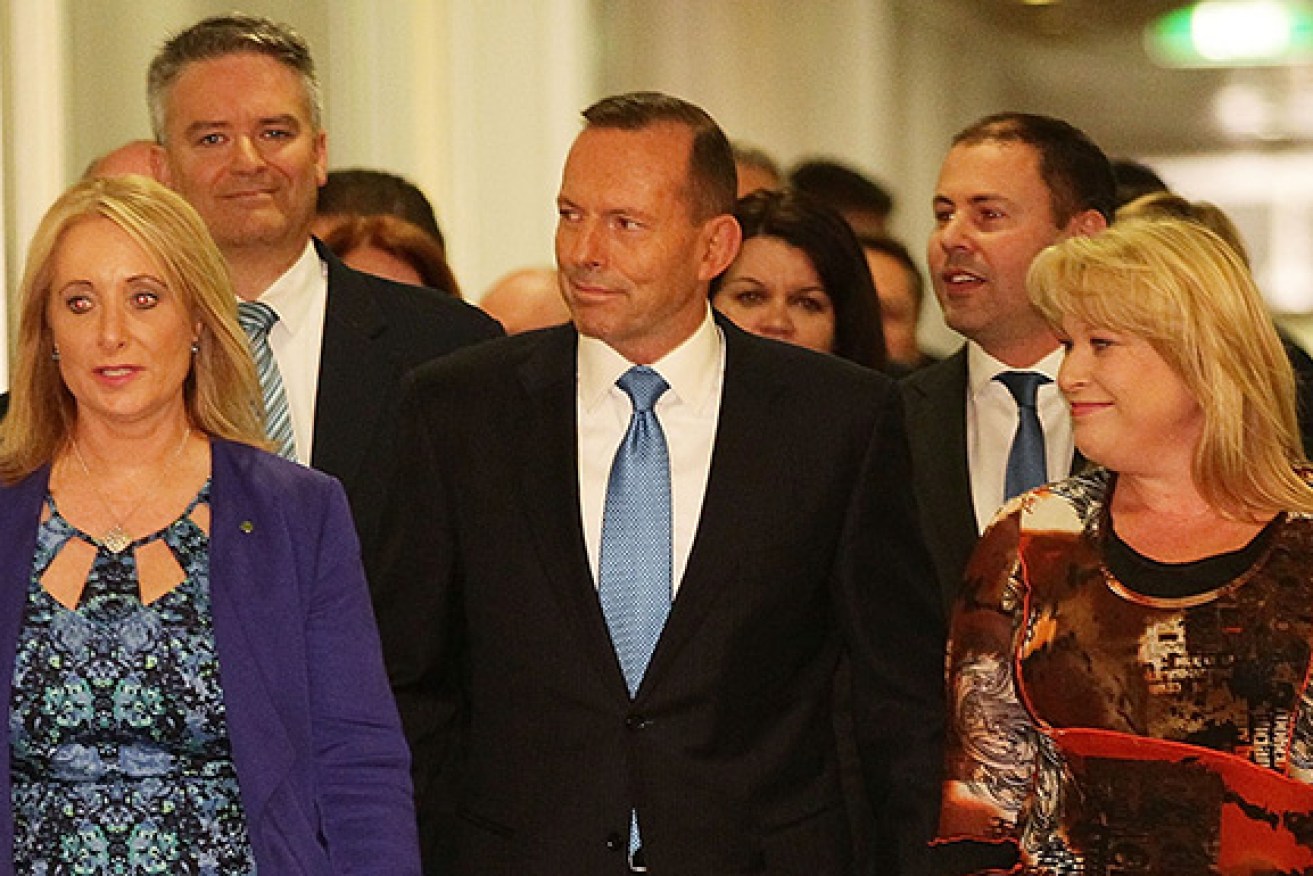Turnbull’s challenge – not scaring off his own party


Getty
Tony Abbott, Prime Minister, and Minister for Women, walked into the party room leadership ballot flanked by several female MPs. It was to be his last symbolic gesture as leader of his party.
Malcolm Turnbull, the then would-be Prime Minister, entered amid a swarm of men.
They were unlikely images, especially considering the fact that one of Turnbull’s likely first acts as Prime Minister will be to appoint a number of new female ministers to his cabinet.
• Worst government ever? Well, they said it
• Malcolm, welcome to the job. Here’s your to-do list
• How the leadership challenge unfolded
• Turbull’s first words after taking the leadership
• Australia’s musical chairs of political leadership
• The economic challenges Turnbull could inherit
At least, it will be if he’s smart.

Malcolm Turnbull announces he will challenge Tony Abbott. Photo: AAP
Of course, on substance it’s the right thing to do. It would make clear how seriously the nation’s new leader takes the issue of women’s representation in leadership positions, and the ongoing struggles of the Liberal party to address this very real problem.
But in politics every substantive decision is also a political decision with costs and benefits. And this early decision will provide an eagerly waiting electorate with some insight into what sort of political management we can expect from Turnbull.
There are two obvious political considerations for Turnbull here. The first is the opportunity to make a clean and clear break with the Abbott years. Turnbull, constrained by working under a leader with whom he disagreed on so much, will feel the personal pull of marking out his distance from his predecessor. Every leader feels this; none, I suspect, will have felt it as keenly as Turnbull.

On the march: Abbott and supporters walk to vote on the leadership. Photo: Getty
The second runs in precisely the opposite direction: to signal to Abbott’s supporters, and the conservatives in the party, that he is not about to alienate them all.
By “alienating them” I don’t mean the right wing of the Liberal Party is so easily alienated as to be shocked by the mere appointment of women. I am talking about the simple mathematics of cabinet: there are only so many spots to go around.
On the first consideration, Turnbull should appoint a number of new women cabinet ministers, far above the dismal numbers there now.
But in order to do that he will have to get rid of some old deadwood – some old, male deadwood. That is easier said than done. Sacking people creates enemies.
This is the challenge Turnbull will face again and again as he confronts the question of what to do now he has the crown he has always wanted: proving he is the anti-Abbott while not becoming so virulently anti-Abbott as to tear the party apart.
Sometimes that will come about in the one decision: going a little one way, but not too far. For example, there are reports already that he has agreed to keep Tony Abbott’s plebiscite on same-sex marriage rather than proceeding with a parliamentary conscience vote, but bring forward the timing of that plebiscite.

Tony Abbott exits stage right after announcing the timing of the ballot.
And sometimes it will come about through doing exactly what he should do and be damned with the consequences – while pleasing his critics in other ways, on other topics. Appointing more women to cabinet is a no-brainer. Yes, he will upset some MPs, but better to do it now when his political capital is at its peak.
So what else can he do easily?
Firstly, he should not go to an election any time soon. He indicated that he intended to go full term. That would be the right thing to do.
More than anything the Australian people crave stability. Turnbull should give it to them by showing the nation that he can govern effectively. That will take time.
Second, he should ensure Tony Abbott gets his full prime ministerial pension. There have been suggestions Abbott will have fallen just days short of qualifying – through duration of service – for the full amount that comes with having led the nation. He should also provide Abbott with the full suite of privileges given to John Howard, Kevin Rudd and Julia Gillard. It would be graceful and generous, and it would smooth some feathers among Abbott’s supporters.

Malcolm Turnbull enters the party for the ballot. Photo: AAP
Third, Turnbull should quickly and quietly dispense with knights and dames, and accompany that action with its obvious corollary: keeping alive the option of taking the path towards a Republic at some point. It will not be entirely well received within his party, but he does not have to go far or fast on this, and even gesturing towards it would prove he was still his own man and remove some of the advantage Bill Shorten’s republican statements have delivered.
But far more important for Turnbull is making clear that his priority, above any social or cultural questions, is what he said it was on Monday afternoon: economics. He must do what is necessary to convince the nation he is serious about this.
Abbott and Hockey were trapped by their first budget: having frightened the nation badly they then had to do everything they could to convince voters there was no need to be frightened. To achieve that, they followed that first budget by ruling out almost everything under the sun. Turnbull does not face those constraints. He could easily rule out the drastic social measures of the first Abbott budget – notably changes to Medicare – while declaring that all economic reform options, including superannuation and taxation, are on the table. This would be sensible politically and substantively.
Still, those are the easy bits. Pleasing his party, voters, and a fractious senate will not be easy. To take just the most obvious example, it seems likely he has had to give some commitments to his conservative colleagues not to go down his favoured path of an emissions trading scheme. I imagine he will also publicly argue strongly that he believes in climate change, and in significant action on climate change.
How on earth will he manage to square that circle?
Sean Kelly was an adviser to Kevin Rudd from 2009 then to Julia Gillard from 2010. He is on twitter @mrseankelly








